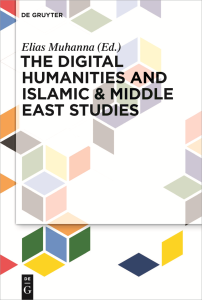 We are pleased to announce the publication of a new edited volume from De Gruyter entitled The Digital Humanities and Islamic & Middle East Studies. Many of the articles in this volume were given as papers at the 2013 conference of the same name, organized by Middle East Studies at Brown University.
We are pleased to announce the publication of a new edited volume from De Gruyter entitled The Digital Humanities and Islamic & Middle East Studies. Many of the articles in this volume were given as papers at the 2013 conference of the same name, organized by Middle East Studies at Brown University.
- Elias Muhanna, Islamic and Middle East Studies and the Digital Turn
- Travis Zadeh, Uncertainty and the Archive
- Dagmar Riedel, Of Making Many Copies There is No End: The Digitization of Manuscripts and Printed Books in Arabic Script
- Chip Rossetti, Al-Kindi on the Kindle: The Library of Arabic Literature and the Challenges of Publishing Bilingual Arabic-English Books
- Nadia Yaqub, Working with Grassroots Digital Humanities Projects: The Case of the Tall al-Zaʿtar Facebook Groups
- Maxim Romanov, Toward Abstract Models for Islamic History
- Alex Brey, Quantifying the Quran
- Till Grallert, Mapping Ottoman Damascus Through News Reports: A Practical Approach
- José Haro Peralta and Peter Verkinderen, “Find for Me!”: Building a Context-Based Search Tool Using Python
- Joel Blecher, Pedagogy and the Digital Humanities: Undergraduate Exploration into the Transmitters of Early Islamic Law
- Dwight F. Reynolds, From Basmati Rice to the Bani Hilal: Digital Archives and Public Humanities
